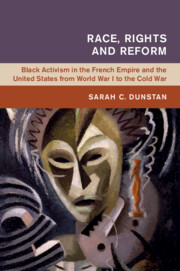 Race, Rights and Reform
Race, Rights and Reform Published online by Cambridge University Press: 01 March 2021
For many, independence from the conflict between the two world superpowers was as important as freedom from colonization under France or Britain. This chapter charts the possibilities that key African American and francophone black intellectuals explored in tandem through their connections to the journal and publishing house Présence Africaine in the years from 1956 through 1960. The work of thinkers such as Aimé Césaire, Richard Wright, Frantz Fanon and W. E. B Du Bois directly shaped the relationship between the Republics of the United States and France and formed contemporary notions of the relationship between politics and culture in staking civic rights claims in the Western framework. Here, the thought of these black thinkers - distilled from congress transcripts, journal articles, private correspondence and published monographs – is mapped out in terms of US State Department and French Colonial Office surveillance of their efforts and each country's approaches to decolonization. Not only does this illuminate the work of understudied figures such as Alioune Diop, Christine Yandé Diop, Mercer Cook and James Ivy but it also shows the ways that their work directly shaped the relationship between the Republics of the United States and France as well as contemporary notions of citizenship rights.
To save this book to your Kindle, first ensure [email protected] is added to your Approved Personal Document E-mail List under your Personal Document Settings on the Manage Your Content and Devices page of your Amazon account. Then enter the ‘name’ part of your Kindle email address below. Find out more about saving to your Kindle.
Note you can select to save to either the @free.kindle.com or @kindle.com variations. ‘@free.kindle.com’ emails are free but can only be saved to your device when it is connected to wi-fi. ‘@kindle.com’ emails can be delivered even when you are not connected to wi-fi, but note that service fees apply.
Find out more about the Kindle Personal Document Service.
To save content items to your account, please confirm that you agree to abide by our usage policies. If this is the first time you use this feature, you will be asked to authorise Cambridge Core to connect with your account. Find out more about saving content to Dropbox.
To save content items to your account, please confirm that you agree to abide by our usage policies. If this is the first time you use this feature, you will be asked to authorise Cambridge Core to connect with your account. Find out more about saving content to Google Drive.